PostHog is better with teammates. You only have to create a dashboard once, but it becomes more valuable every time you invite someone from your organization to view it. And this isn't just some vague truism: it's a measurable fact.
Our data shows organizations with multiple teammates retain 30%+ better than those with a single user. Better collaboration also powers our main Product metric: insight discoveries. Our conservative estimates suggest we could increase discoveries by 20% by improving collaboration workflows 1, so that's what we've done.
Over the past few months, we've worked hard to make collaboration in PostHog as easy as possible, particularly for larger teams. That work will never end, but we want to show you what we have today and share our roadmap for the future.
Sharing insights with stakeholders
The most basic collaborative action for an analytics product is sharing insights. This is critical because, in larger teams, there are usually multiple stakeholders making or influencing product decisions. In order to make solid decisions, you have to share context - such as letting your Marketing team see their impact through metrics such as high quality signups.
To address the above we introduced robust permalinks to insights that can easily be shared across multiple mediums. These links can now be used to send a specific insight (with all configurations) to a colleague, even if you are working across multiple projects.
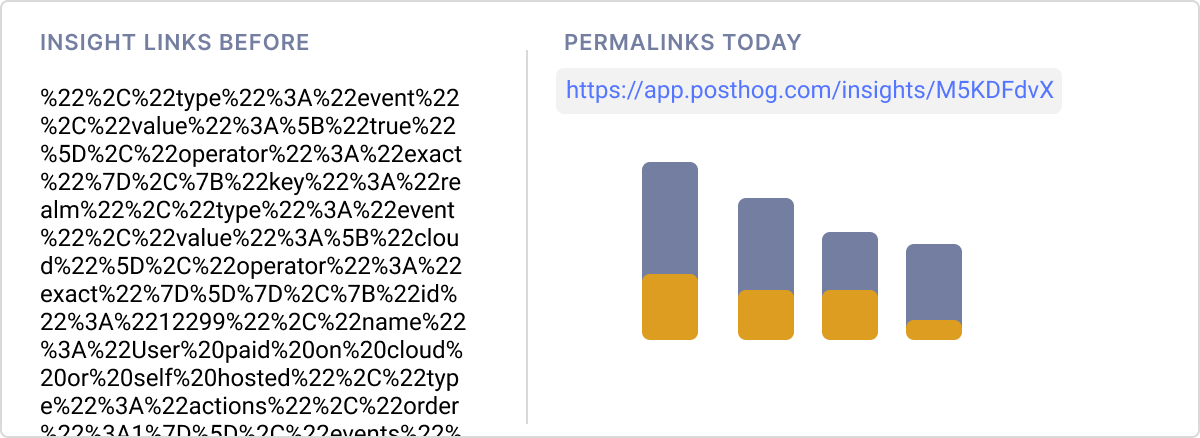
You can share dashboards easily too. Even if you share a link to a dashboard in a different project, recipients will be automatically switched to the correct project if they have access
In small teams it's common for a single person to own the analytics process, but feedback from larger clients demonstrated this wasn't the case for them. In response, we've introduced granular permissions to give users full control over who can edit their dashboards. This makes it easier for larger teams to work together, without stepping on each others toes.
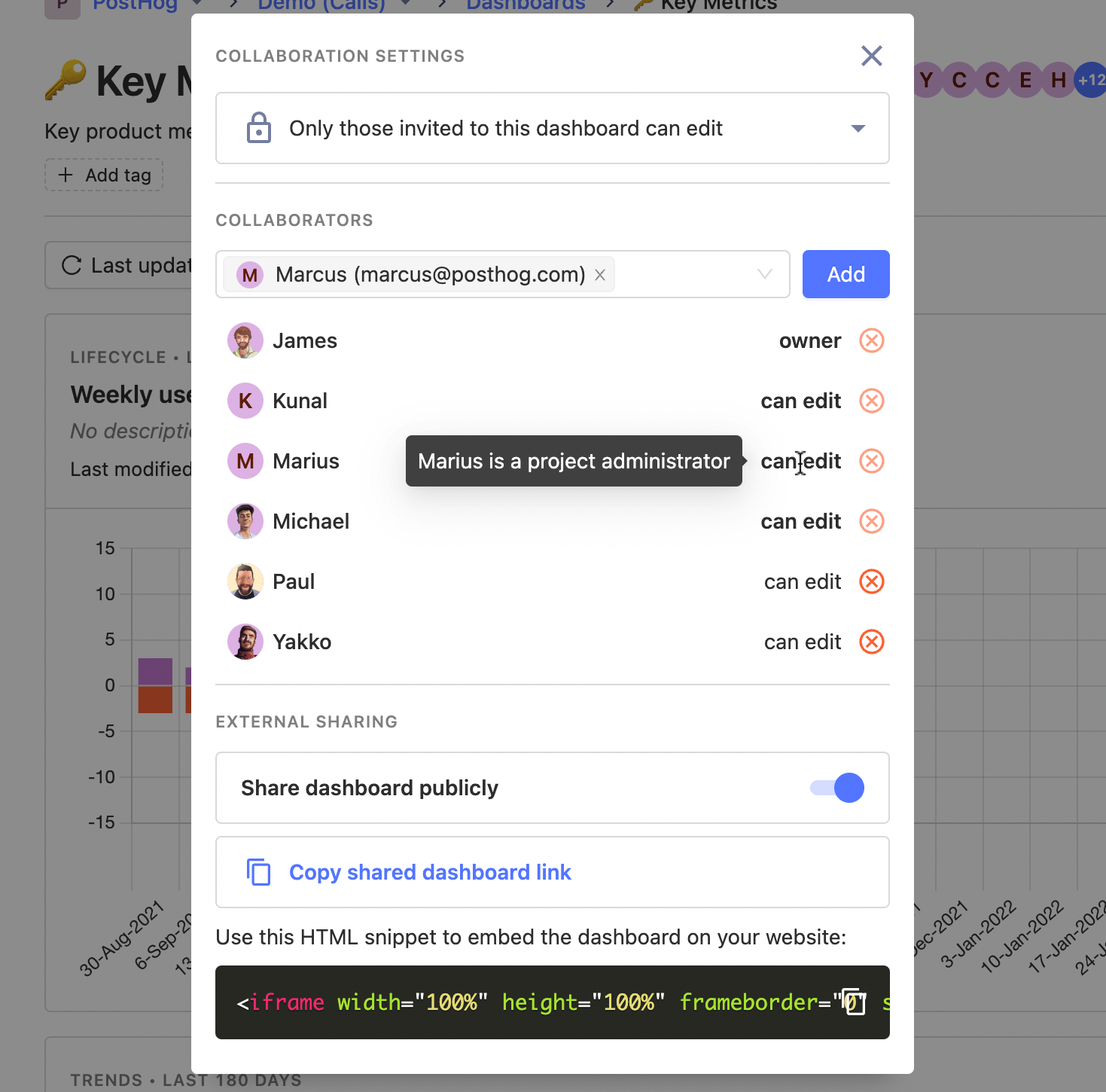
Exploring data speculatively
Sometimes you don't know what you're looking for, or you don't know where to start. There are many different avenues to improving your product. For example, we recently discovered users seldom use our Paths advanced features and these could introduce mental burden to users.
To aid serendipitous discoveries, we've created a project homepage to surface helpful insights you may not have considered. By making it the default page on PostHog, our aim is to help users make quick discoveries. We'll surface your most important product and company metrics here as well as popular insights, and we're leveraging social proof from what other teammates are doing in your app to help you discover more product improvements.
In addition, if your team uses the Session Recording feature, we'll also surface the most recent recordings here. We've found that users who return to Session Recordings make 3x more discoveries than other users (more context here). This should also help drive qualitative discoveries about your product.
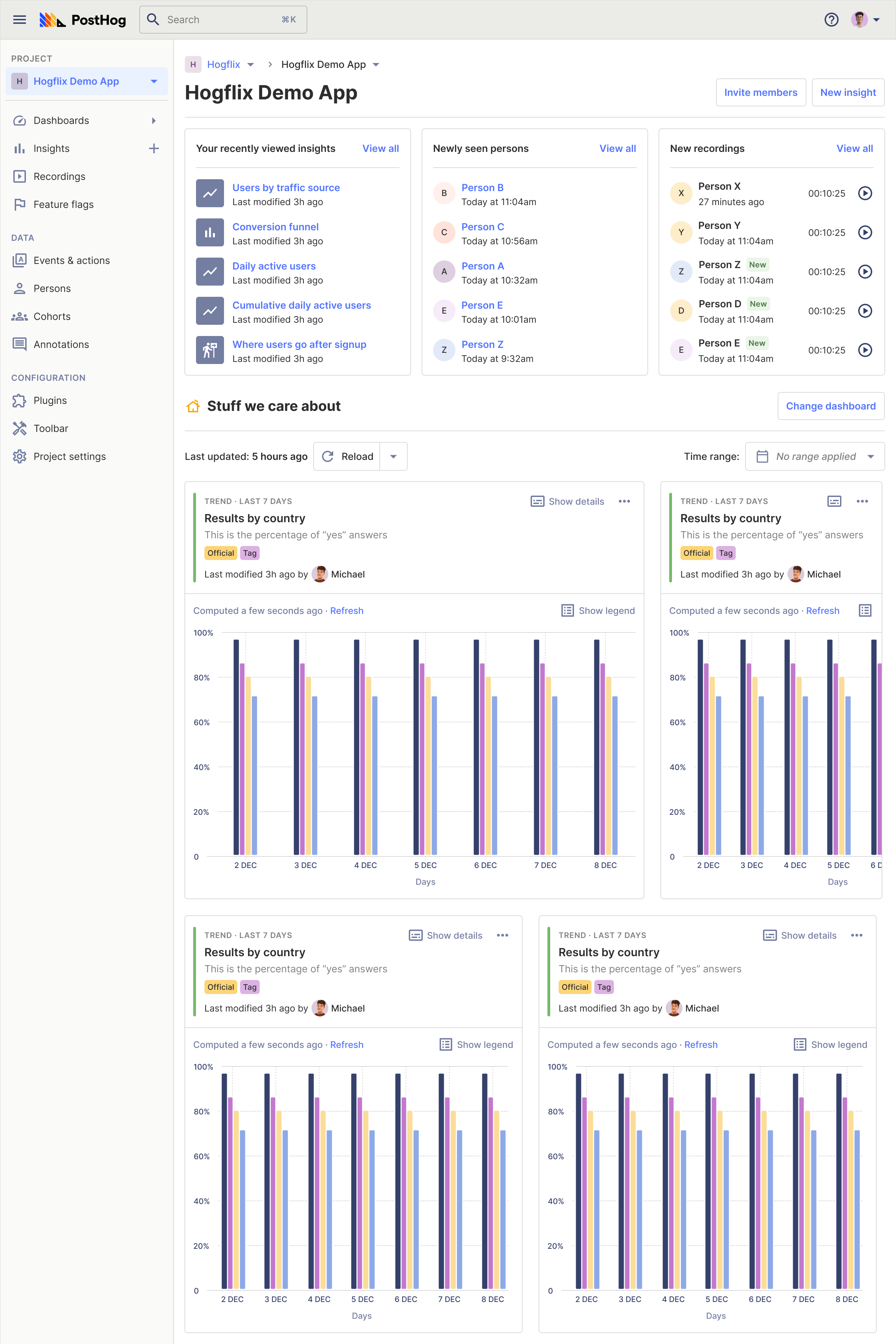
Leveraging the work of your colleagues
We find there are two general profiles for PostHog users:
- People who are naturally curious and whose job leads them to discover insights all the time and across multiple dimensions.
- People who use PostHog to answer specific questions as they arise.
For people who create insights, we've introduced one-click saving and automatic insight naming. This means people who create lots of insights don't have spend time documenting their work, while their colleagues can easily understand what they're looking at.
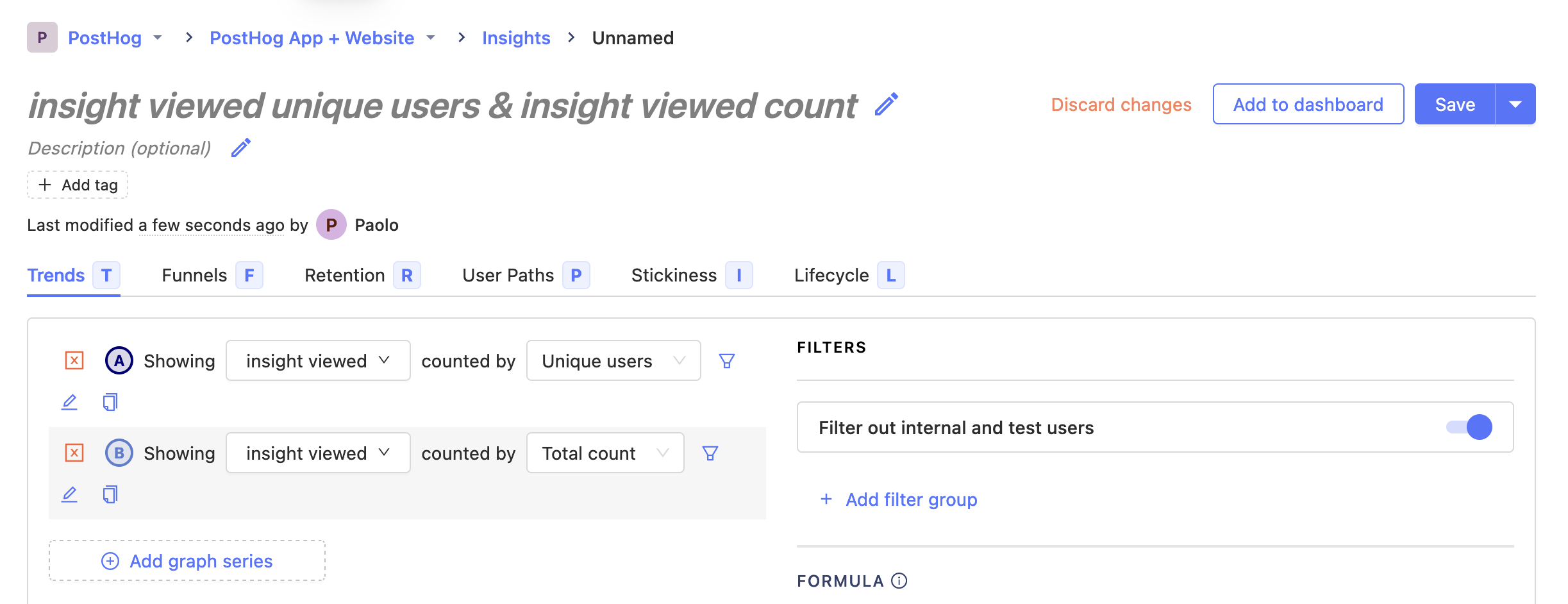
And for people who love discovering insights that others made, we've made it easier to search and find saved insights.
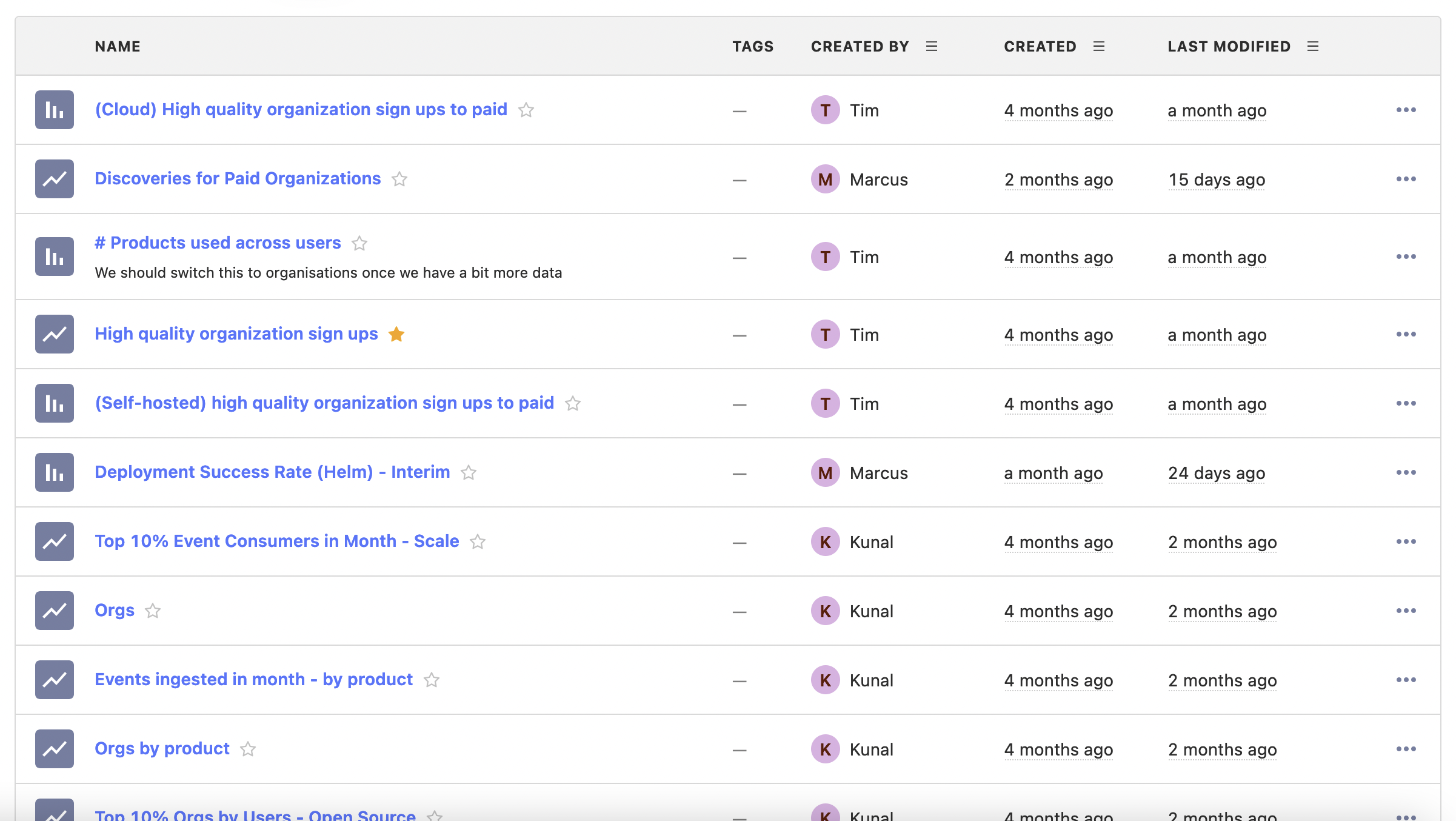
To support this work, we also introduced the new Data Management feature, which brings together all the context on how your product is instrumented. Now there's no need to ask an Engineer or Product Manager which event you should use to answer a question, which both parties will appreciate!
What's next?
We're continuing to actively work on improving collaboration throughout the product and we have some specific plans in our short term roadmap.
However, we're a fast moving company and we continuously reprioritize based on feedback, market needs, etc., so the way we tackle this problem may change.
With the disclaimer above in mind, here's some exciting stuff we hope to ship soon.
Slack Previews
Almost every team uses some sort of Instant Messaging tool (think Slack, Discord, Teams, ...) and in particular, it's a place for discussions. We believe that adding more context when you share a link to a PostHog insight or dashboard will speed up discussions (e.g. a screenshot of the graph, general details, recent changes, ...). We're starting with Slack to test drive this concept, but if successful, expanding to other tools will make sense.
Email subscriptions to dashboards and insights
As we analyzed dashboard usage in PostHog, we discovered it's quite common for teams to have one or two dashboards that represent their critical metrics, such as number of sales for an e-commerce company or retention for a pre-Product-Market-Fit startup.
A very user-friendly way of keeping users updated on these metrics is by integrating with their current workflows, such as email. Soon you'll be able to start your Mondays (or any other day) with a digest of how your product and company are doing.
Embeddable graph images
You've seen the typical Medium post with a graph, well we have too and we hate they're not PostHog graphs. But aside from that superficial argument, teams have different workflows and tools where product context is shared (e.g. an intranet, Notion, Google Docs, code repositories, blog posts). Usually product decisions are at least data-informed (and we do hope this will help drive this behavior further), so we want to make sure that the context from product data is properly shared, accessible and preserved. In particular, we also want to make sure these context remains up-to-date.
As always, we welcome and highly encourage you to share any feedback you may have about this or any other feature. Give us a shout in our community Slack or join us directly for a call with our Product or Engineering team.
PostHog is an open source analytics platform you can host yourself. We help you build better products faster, without user data ever leaving your infrastructure.
Ready to find out more?
- Based on the average number of discoveries per active user and the number of teammates that never perform a discovery, we estimated that we could get at least a ~12%+ increase in active discoverers, and 20%+ increase in weekly discoveries.↩

